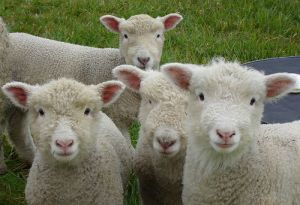The dryer door is flung open. Freshly spun laundry is pulled from the washer and stuffed into an inevitable inferno. A dainty web of polyester fibers is plucked from it’s box with the very tips of her fingers. It’s smell is chemically designed to be pleasant. In it’s unused state it is offensive and overpowering.
With her nose angled away from the dryer sheet she releases it onto her families laundry. The door is shut and the 70 minute heat cycle begins to bellow in. A liquid surfactant, which may be quaternary ammonium compounds, sulfate compounds, or silicone derivatives, leaves the surface of the fabric just slightly oily. Once the cooled and folded clothing is lovingly placed in it’s respective homes the liquid surfactant has formed a solid coating on the fabric. That sweet smelling, wrinkle free t-shirt is a carrier of chemicals ready to seep into your pores.
Wool is part of the natural lifecycle of sheep. They grow wool continuously. If they are not sheared at least once a year, they become stressed and uncomfortable, especially when it is hot and humid. So what do we make of an endless natural resource in a society stressed for time with a conscience for going green?
The dryer door is flung open. Freshly spun clothing is pulled from the washer and stuffed into an inevitable inferno. They land on a half dozen natural, wool dryer balls. The door is shut and the heat cycle begins. The wool dryer balls bounce around with the laundry in the dryer, separating the clothes and allowing air to circulate and soften them. They cut the drying time by 25% or more by absorbing up to 30% of their weight in water.
The fresh, chemical free laundry is removed and the wool dryer balls are left behind in the dryer for the next cycle. Time, money, energy, and health have been saved. Well done, sheep. Well done.

No comments:
Post a Comment